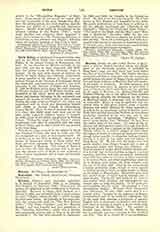

Bracken, THOMAS, poet, journalist, politician, b. in Ireland December 21, 1843; d. at Dunedin, New Zealand, February 16, 1898. Having lost his parents he emigrated in his twelfth year to Victoria, Australia. He went to Otago, New Zealand, as a shearer in 1869, and published there a small volume of verse, “Flights among the Flax”, which brought him into some notice. In Dunedin he was associated with the commercial staffs of “The New Zealand Tablet”, “The Otago Guardian”, and the “Morning Herald”, and was founder and part proprietor of the “Saturday Advertiser”, which was a literary and commercial success only so long as he directly controlled it. He was twice returned to Parliament (in 1884 and 1886) for Dunedin in the Liberal interest. He died in the Dunedin hospital. He is best known in New Zealand and Australia for his verse. His poetic publications in book form, in addition to the one already mentioned, are: “Flowers of the Freeland”; “Behind the Tomb and Other Poems”; “The Land of the Maori and the Moa”; and “Musings in Maoriland” (Dunedin, 1890), his last and fullest collection. Bracken’s themes are mostly local and colonial. He is not a world-poet, but takes honorable rank among the pioneers of Australian poetry. In his best verse, much true and tender poetic feeling finds skilled and picturesque expression.
HENRY W. CLEARY

